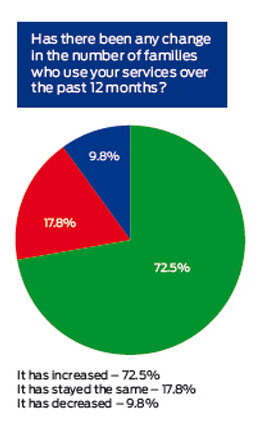
The census, carried out by charity 4Children and based on the responses of 501 children's centre staff, reveals that for the first time more than a million families are using their local centre, including 320,000 disadvantaged families.
 4Children said its data indicates that 1,090,000 families are using children's centres, up from 980,000 in the 2012 census, representing an 11 per cent increase over the past year.
4Children said its data indicates that 1,090,000 families are using children's centres, up from 980,000 in the 2012 census, representing an 11 per cent increase over the past year.
Despite this, the charity estimates that around 60 centres could close over the next 12 months due to 'acute financial pressures' on local authorities.
The estimate is based on the two per cent of respondents that said they expect their setting to be closed within a year's time, which 4Children says if replicated throughout the country could mean around 60 centre closures across England.
Register now to continue reading
Thank you for visiting Nursery World and making use of our archive of more than 35,000 expert features, subject guides, case studies and policy updates. Why not register today and enjoy the following great benefits:
What's included
-
Free access to 4 subscriber-only articles per month
-
Unlimited access to news and opinion
-
Email newsletter providing activity ideas, best practice and breaking news
Already have an account? Sign in here
